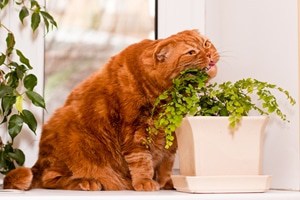Study says pet obesity is often a product of ’emotional overeating’
 While the obesity epidemic among people may be one of the biggest health concerns in the United States, the same malady appears to be afflicting their pets. And as with humans, animal obesity may be partially caused by “emotional overeating,” similar to how people eat unhealthy comfort foods when stressed or suffering from depression, according to a study published in the Journal of Veterinary Behavior.1
While the obesity epidemic among people may be one of the biggest health concerns in the United States, the same malady appears to be afflicting their pets. And as with humans, animal obesity may be partially caused by “emotional overeating,” similar to how people eat unhealthy comfort foods when stressed or suffering from depression, according to a study published in the Journal of Veterinary Behavior.1
Overweight pets more than just an Internet meme
Whether you have one yourself or know a friend who does, overweight pets – especially cats and dogs – seem to be everywhere these days. Although it’s clear that their obesity is a product of too much food or their lazy ways around the house, it turns out the reason they are doing those things is the same as it is for humans.
The new study, conducted by Dr. Franklin McMillan, a former veterinarian and retired clinical professor of medicine at the Western University of Health Sciences College of Veterinary Medicine in California, shows that our pets overeat primarily out of boredom and stress.
It turns out, all that lying around your cat has been doing isn’t necessarily because it is naturally lazy, it’s because, for whatever reason, it is suffering from the same kind of motivation problems that a stressed out or depressed human might.
Obesity in cats and dogs and how to treat it
According to McMillan’s research, up to 45 percent of dogs and 25 percent of cats are obese, both of which are alarming numbers. But in order to bring those numbers down, he says that taking away their food might actually be counterproductive, effectively eliminating their coping mechanism.2
Instead, McMillan advises pet owners to search for the emotional underpinnings of their pet’s overeating. And getting it more involved in physical activities like running, walking and playing with toys might help it deal with those problems. Otherwise, consider consulting your veterinarian or a certified veterinary technician.
1 McMillan, Dr. Franklin, “Stress-induced and Emotional Eating in Animals: A Review of the Experimental Evidence and Implications for Companion Animal Obesity,” Journal of Veterinary Behavior, Sept. 2013. http://www.journalvetbehavior.com/article/S1558-7878(12)00201-8/abstract
2 Copping, Jasper, “Got a Fat Pet? It May Be Prone to ‘Emotional Overeating’,” The Daily Telegraph, Sept. 21, 2013. http://www.leaderpost.com/health/prone+emotional+eating/8943561/story.html